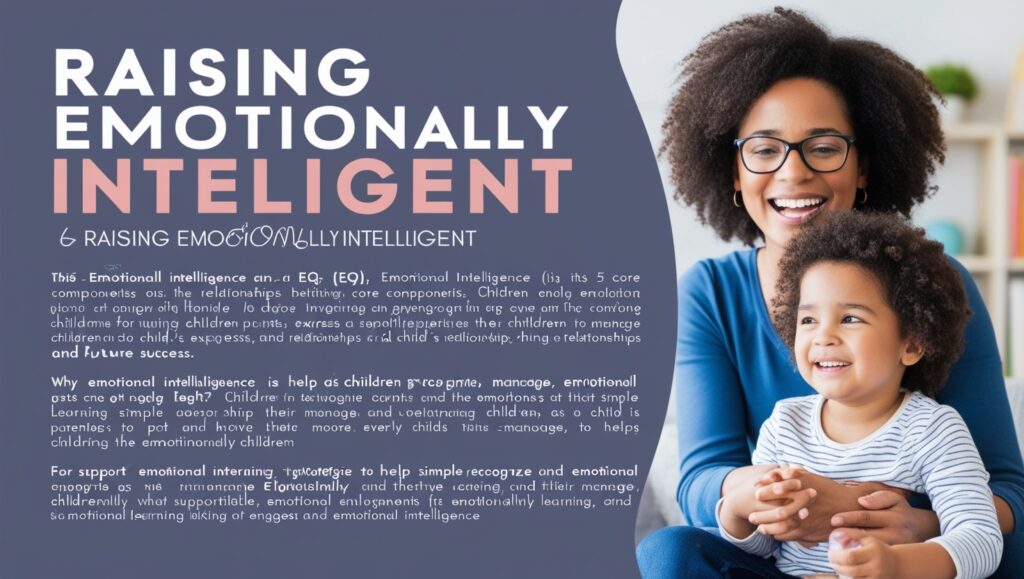Raising Emotionally Intelligent Children
In an ever-changing world where academic success often dominates parenting goals, emotional intelligence (EQ) is emerging as a vital skill — one that helps children navigate relationships, cope with challenges, and grow into compassionate, confident adults. Raising Emotionally Intelligent Children Unlike IQ, which is largely innate, emotional intelligence can be nurtured and developed from a young age.
So, what exactly does it mean to raise emotionally intelligent children? And how can you, as a parent or caregiver, lay a foundation that encourages empathy, resilience, and self-awareness?
In this blog post, we’ll explore the key components of emotional intelligence, why it matters, and how you can incorporate EQ-building practices into everyday parenting.
What is Emotional Intelligence?
Emotional intelligence is the ability to recognize, understand, manage, and express emotions — both our own and those of others. According to psychologist Daniel Goleman, EQ consists of five main components:
- Self-awareness – Understanding one’s emotions and their impact.
- Self-regulation – Managing emotions and controlling impulses.
- Motivation – Using emotions to pursue goals and remain optimistic.
- Empathy – Recognizing and understanding the emotions of others.
- Social skills – Navigating relationships, resolving conflict, and cooperating with others.
Why Emotional Intelligence Matters for Children
Emotional intelligence affects nearly every aspect of a child’s life:
- Academic Success: Emotionally intelligent children are better at handling stress and focusing on tasks.
- Better Relationships: They are more empathetic, kind, and capable of managing social interactions.
- Mental Health: Children who understand their emotions are more likely to manage anxiety, depression, and behavioral issues.
- Conflict Resolution: EQ helps children express disagreement respectfully and find peaceful solutions.
- Future Readiness: In adulthood, EQ is linked to better job performance, leadership, and life satisfaction.
How to Raise Emotionally Intelligent Children
Here are actionable strategies you can use as a parent to foster emotional intelligence:
1. Model Emotional Intelligence
Children learn by watching adults. Demonstrate how to express emotions in a healthy way, handle stress calmly, and show empathy toward others.
Example:
If you’re frustrated, say:
“I’m feeling frustrated right now, so I’m going to take a few deep breaths before we talk.”
This shows children how to identify and manage emotions constructively.
2. Help Them Name Their Feelings
Teach children to label their emotions by using age-appropriate language.
- For younger kids: happy, sad, mad, scared, excited.
- For older kids: disappointed, embarrassed, anxious, proud.
Tip:
Use books, stories, or cartoons to discuss characters’ emotions and relate them to real-life feelings.
3. Validate Their Emotions
Avoid dismissing a child’s feelings. Instead, acknowledge and accept their emotions, even if you don’t agree with their reaction.
Example:
“I can see that you’re upset because your toy broke. That must feel really disappointing.”
This builds trust and helps children feel understood.
4. Teach Self-Regulation Tools
Once children recognize their emotions, they need help learning how to manage them. Here are some helpful techniques:
- Deep breathing or counting to 10
- Drawing or journaling feelings
- Taking a break or quiet time
- Using a “calm down corner” or cozy space
Consistency is key — use the same tools regularly so children become familiar with them.
5. Encourage Problem-Solving
Guide your child in thinking through solutions to conflicts or challenges.
Ask questions like:
- “What do you think we can do about this?”
- “How could you handle this differently next time?”
This empowers them to take ownership and build resilience.
6. Praise Effort, Not Just Results
When children handle emotions well or show empathy, acknowledge it. Praise their effort, thoughtfulness, or ability to stay calm.
Example:
“I noticed you took a deep breath instead of yelling when you were angry. That was a great choice!”
7. Create an Emotionally Safe Environment
Make your home a place where feelings can be expressed without judgment. Encourage open communication and respect privacy and boundaries.
Ideas:
- Have regular family talks or check-ins
- Use feelings charts or emotion wheels
- Let children talk without interrupting or correcting
Emotional Intelligence at Different Ages
Toddlers (1–3 years)
Focus on basic emotional words and routines. Use simple books and songs to express feelings.
Preschoolers (3–5 years)
Introduce more complex emotions and practice self-control through games and stories. Raising Emotionally Intelligent Children
School-age Children (6–12 years)
Help them understand empathy, friendships, and emotional consequences. Encourage journaling or creative expression.
Teens
Support emotional independence while continuing open conversations. Respect their growing need for privacy and trust.
Activities to Boost Emotional Intelligence
- Feelings Charades: Act out emotions and guess them
- Emotion Drawing: Draw pictures that show different feelings
- Story Time Discussions: Pause during books to ask, “How do you think they feel?”
- Gratitude Journals: Write or draw things they’re thankful for each day
- Mindfulness Exercises: Practice deep breathing or short meditations together
Final Thoughts
Raising emotionally intelligent children is one of the most powerful things you can do as a parent. Raising Emotionally Intelligent Children It equips them not only to succeed academically or professionally but also to build deeper connections, make wiser choices, and live more balanced, empathetic lives.
Remember, emotional intelligence is not developed overnight — it’s a journey of consistent learning, patience, and modeling. But with intentional parenting and daily practice, you can help your child grow into a resilient, compassionate, and emotionally aware individual.

